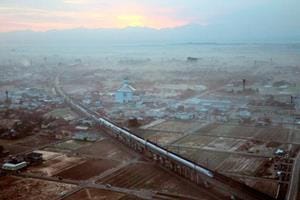The preparatory work for the Mumbai-Ahmedabad bullet train project is in full swing and the loan agreement with the Japan International Cooperation Agency (JICA) is likely to be signed by the end of this year, official sources told FE.
Also, the top management of the National High Speed Rail Corporation Ltd, an SPV formed to implement and oversee the bullet train project, will be in place in the next two-three months, they added.
The SPV, with an authorised capital of Rs 20,000 crore, will commence physical work for the 508-km bullet train project in late 2018, with a plan to commission the whole project in 2023-2024. “The preliminary work has already started for the project and we have had six meetings till date with the Japanese counterparts. Follow-up studies are also taking place. Right now, we are at the loan negotiation stage and we are confident of signing the STEP (Special Terms for Economic Partnership) loan agreement with the JICA by the end of this year,” a senior official in the railway ministry said.
“After the loan agreement is signed, we will appoint a general consultant who, on the basis of the final technical and design standard report, will float tenders inviting for civil contracts,” the source added.
The Mumbai-Ahmedabad bullet train project will be built at a cost of approximately Rs 1 lakh crore; Japan has agreed to fund 80% of the project through a soft loan of Rs 79,000 crore at an interest rate of 0.1%, with a tenure stretching over 50 years and a moratorium period of 15 years.
According to the detailed project report (DPR) accessed by FE, the bullet train is expected to run at a speed of 320 kmph and will complete the whole journey in 2.07 hours non-stop and 2.58 hours with stoppages, as opposed to seven hours taken currently by Duronto Express. A major highlight of the project will be the 21-km under-water tunnel to be constructed at Thane creek through which the bullet train will pass.
The DPR has pegged the economic rate of return of the project at 12% while the financial rate of return is estimated at 4%.
While the transporter is gearing up to finalise the Ahmedabad-Mumbai bullet train project, France-based Systra and India Railway’s subsidiary RITES earlier this month submitted the draft feasibility report for the Delhi-Chandigarh-Amritsar bullet train project and has pegged the cost of construction for the whole project at Rs 1 lakh crore. The report has also proposed the project to be government-funded as against the PPP mode of funding. The final feasibility report is expected to be submitted to the railway board in May 2016, after which the railway board is expected to take a call on how to go forward with the project.

